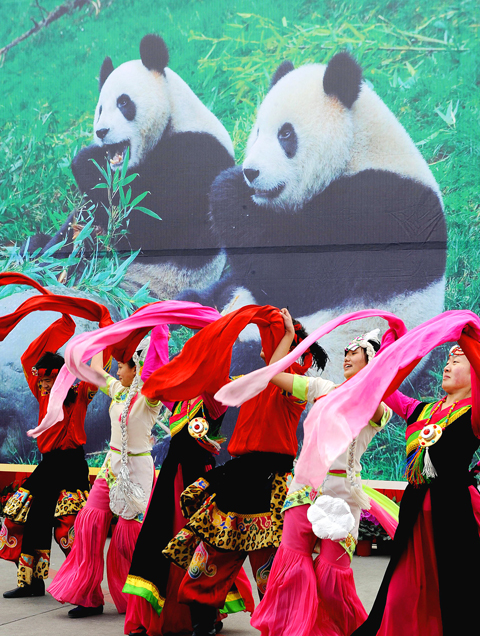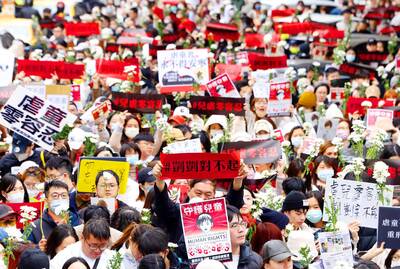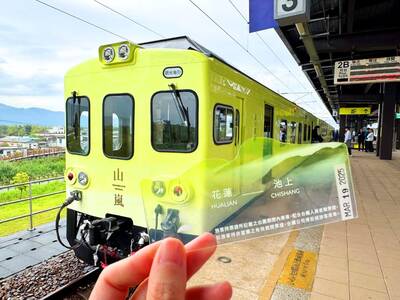The importation of two giant pandas from China is part of Beijing’s strategy to “internalize” the Taiwan issue and likely an attempt by the Ma Ying-jeou (馬英九) administration to divert public attention from its lackluster performance, some political watchers said yesterday.
With all eyes fixed on the arrival of the two endangered animals in Taiwan yesterday, few paid attention to China’s maneuver to bypass the international export treaty for endangered species classifying the transport of the two pandas as a “domestic transfer.”
The Convention on International Trade in Endangered Species (CITES) of Wild Fauna and Flora stipulates that the transfer of endangered species between two countries must abide by the covenant. The CITES Secretariat, however, said on Monday that it considered China’s export of the two pandas as “domestic trade.”

PHOTO: AFP
Taiwan Society secretary-general Lo Chih-cheng (羅致政) said the importation of the two animals was an overt attempt by Beijing to push toward its goal of Taiwan’s de jure unification with China and part of its strategy to “internalize” the Taiwan question.
“The former Democratic Progressive Party [DPP] government internationalized the Taiwan issue, but the Chinese Nationalist Party [KMT] administration cooperates with Beijing to internalize it,” he said.
It is manifest in the four agreements signed by the both sides, Lo said. Taking the example of direct cross-strait flights, all airports open for such services are “domestic.” The cross-strait food safety mechanism does not need to go through the international health organization either, he said.
“Beijing has a comprehensive strategy of cross-strait relations and is gradually working toward its ultimate goal of de jure unification,” he said.
Criticizing the timing of the importation of the two animals, Lo said he suspected it was an attempt by the Ma administration to distract public attention from the government’s inability to address economic issues and the soaring unemployment rate.
“It costs a lot to keep the two giant pandas. Why don’t they spend the money on children’s school lunches?” he said.
While some families can not make ends meet or even find a job, Lo said the government had put the disadvantaged under pressure because they were unlikely to be able to afford to take their children to the zoo to see the pandas.
“Does the government plan to issue panda vouchers?” he said. “What they are doing is rubbing salt in their wound.”
Chen Yen-hui (陳延輝), a professor at National Taiwan Normal University’s Graduate Institute of Political Science, agreed that the importation of the two pandas was Beijing’s attempt to “internalize” the Taiwan question.
“It is very clear,” he said. “It is Beijing’s ‘united front’ strategy to make the international community think that Taiwan is part of China.”
He, however, said he did not think the timing was questionable.
“It looks a little bit suspicious, but I think it is more of a coincidence meant to coincide with the Lunar New Year and reflect the easing tension between both sides,” he said.
Leou Chia-feng (柳嘉峰), executive director of the Institute for National Development, also said the pandas are an example of Beijing’s systematic strategy of “internalizing” the Taiwan issue.
“From direct transportation links to pandas, Beijing has never changed its policy and is working toward its goal step by step,” Leou said. “Beijing’s strategy toward Taiwan is similar to the one toward Hong Kong. ‘As long as you listen to me, I will keep giving you small favors.’”
During the DPP’s eight years in power, Leou said the pro-independence administration insisted that the exchange of the two animals be made between two states and abide by the CITES. Only seven months after Ma took office, the two giant pandas managed to come to Taiwan, Leou said.
“Apparently, there must have been some kind of compromise or concession made during the negotiation process with Beijing,” he said. “The KMT is simply too naive to believe that there is nothing wrong with making small sacrifices in exchange for something in return.”
While the KMT administration said it was just following a precedent set by the former DPP government in importing endangered plants and animals, Leou said the main difference between the two governments was that the Ma administration did not seem to mind letting Beijing set the political agenda.
As long as Taipei accepted its terms, Leou said, Beijing did not mind giving Taipei some small favors because it would maximize its interests and it would not change its Taiwan policy.
Some have proposed changing the names of the two animals to shake off the political connotation. Leou, however, said that this would not alter the fact that they were considered a “domestic transfer” in the eyes of Beijing and the world.
“I don’t think Beijing would mind a bit if the names were changed, because what matters to them is whether they are in control of the situation and things are going the way they expect,” he said. “The Taiwanese public must heed the ulterior motive rather than superficial matters such as the names of the animals.”

Taiwan yesterday condemned the recent increase in Chinese coast guard-escorted fishing vessels operating illegally in waters around the Pratas Islands (Dongsha Islands, 東沙群島) in the South China Sea. Unusually large groupings of Chinese fishing vessels began to appear around the islands on Feb. 15, when at least six motherships and 29 smaller boats were sighted, the Coast Guard Administration (CGA) said in a news release. While CGA vessels were dispatched to expel the Chinese boats, Chinese coast guard ships trespassed into Taiwan’s restricted waters and unsuccessfully attempted to interfere, the CGA said. Due to the provocation, the CGA initiated an operation to increase

A crowd of over 200 people gathered outside the Taipei District Court as two sisters indicted for abusing a 1-year-old boy to death attended a preliminary hearing in the case yesterday afternoon. The crowd held up signs and chanted slogans calling for aggravated penalties in child abuse cases and asking for no bail and “capital punishment.” They also held white flowers in memory of the boy, nicknamed Kai Kai (剴剴), who was allegedly tortured to death by the sisters in December 2023. The boy died four months after being placed in full-time foster care with the

CHANGING LANDSCAPE: Many of the part-time programs for educators were no longer needed, as many teachers obtain a graduate degree before joining the workforce, experts said Taiwanese universities this year canceled 86 programs, Ministry of Education data showed, with educators attributing the closures to the nation’s low birthrate as well as shifting trends. Fifty-three of the shuttered programs were part-time postgraduate degree programs, about 62 percent of the total, the most in the past five years, the data showed. National Taiwan Normal University (NTNU) discontinued the most part-time master’s programs, at 16: chemistry, life science, earth science, physics, fine arts, music, special education, health promotion and health education, educational psychology and counseling, education, design, Chinese as a second language, library and information sciences, mechatronics engineering, history, physical education

The Shanlan Express (山嵐號), or “Mountain Mist Express,” is scheduled to launch on April 19 as part of the centennial celebration of the inauguration of the Taitung Line. The tourism express train was renovated from the Taiwan Railway Corp’s EMU500 commuter trains. It has four carriages and a seating capacity of 60 passengers. Lion Travel is arranging railway tours for the express service. Several news outlets were invited to experience the pilot tour on the new express train service, which is to operate between Hualien Railway Station and Chihshang (池上) Railway Station in Taitung County. It would also be the first tourism service